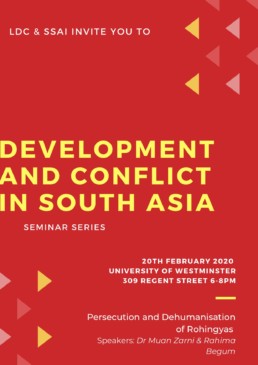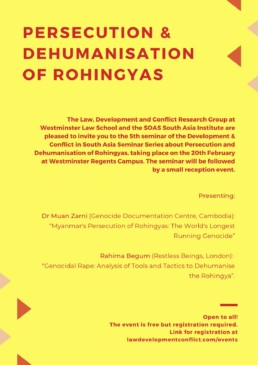LDC EVENTS
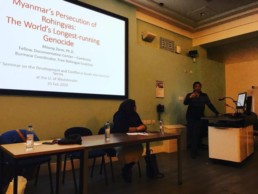
LDC members Radha D’Souza and Angelica de Freitas e Silva will be presenting their research at the fifth annual conference of the Law and Development Research Network (LDRN) – “Beyond the Crisis: Challenges and Opportunities for Law and Development”. The conference will be hosted online by the Nelson Mandela University Faculty of Law, South Africa, on 24 – 26 November 2021.
Dr. Angelica De Freitas E Silva was the keynote speaker at the VI Tarragona International Environmental Law Colloquium (TIEC), where she delivered her speech titled “Environmental Law In The Ethics Of Exhaustion“, organized by the Tarragona Centre for Environmental Law Studies (CEDAT-URV) and the Tarragona Environmental Law Students Association (AAEDAT) held on 14, 15 and 16 June 2021.
The NGO a_Ponte is promoting the series Bridging Institutionality and the Decolonial Debate to bring aspects of coloniality (and its differences with colonialism) and how to decolonize. The central idea is to explain the action for decoloniality – the decolonial movement, which is neither simple nor immediate, but urgent. The course is a partnership between a_Ponte and the Law, Development and Conflict Research Group, and will be taught by Angélica de Freitas e Silva, PhD, LDC member. There will be 4 seminars, always at 8:30 pm UK time, on Wednesdays in March 2021. The seminars will be streamed live at a_Ponte YouTube channel. Seminars will be recorded and made available latter. The official language is Portuguese and CC in English will be available.
Join CAMPAAC, TNI and CAGE for a webinar where Dr Asim Qureshi will be chairing an interactive panel of experts to discuss a real alternative to the failed status quo, and how we can build healthy and safe societies without surveillance and securitisation.
The response to the Coronavirus pandemic by governments and public worldwide have shone a light on two very different worlds: we have seen an exceptional outpouring of support, solidarity and mutual aid, and an extraordinary ratcheting up of surveillance and policing.
What awaits us post-pandemic will be very different from the one that existed before, but exactly what that looks like will be determined by the struggle between these two very different visions.
As CAGE’s report Exploiting a Pandemic – The Security Industry’s Race to Infiltrate Public Health has shown, the forces of the security and counter-terror industries have been working to find their place in this new context.
It is vital, therefore, that the public and civil society in Britain and beyond develop a wide-ranging, coherent platform of demands for post-pandemic society, to provide a real alternative to the failed status quo and a turn away from security and surveillance of the past two decades.
Join CAGE, alongside the Campaign Against Criminalising Communities(CAMPACC) and the Transnational Institute (TNI) for an interactive panel.

From June to September, Framer Framed in collaboration with the Goethe-Institut Amsterdam, will host a series of four events focused on the global climate crisis. The first event in the Crisis Imaginaries series will be an online panel discussion with Carola Rackete, Radha D’Souza and Jonas Staal.
***
“Climate change is a virus that paves the way for the dark side of humanity.”— preface “Tijd voor Actie” from Hindou Oumarou Ibrahim
As the world shifts and shutters in response to the Covid-19 pandemic, many have reasserted the importance of responding to climate change at a similar scale. We have watched the two crises intertwine, with early indicators showing a correlation between environmental degradation and an increased chance of animal to human virus contagion; likewise, more severe cases of Corona often appear and affect areas suffering from worse air pollution, with the same patterns of vulnerability exacerbated. What can we learn from our current crisis and take with us for our present and future crisis? Together, we will critically examine the notion of crisis as a spectacle that calls for strong leadership, threatening to devolve toward authoritarian tendencies, and as a narrative constructed from differential viewpoints.
“If the transformation of our society is to succeed, we must listen to each other.” —Carola Rackete
On 16 June, we will host our first chapter of the Crisis Imaginaries series— a panel discussion with Carola Rackete, Radha D’Souza and Jonas Staal moderated by Jeff Diamanti.
Captain and climate and human rights activist CAROLA RACKETE emphasizes the widespread effect of this slow violence and calls for action in the form of civil disobedience and global climate justice. For Rackete, the refugee and climate crises cannot be seen in isolation from each other: The global South is still weighed down by an urge for more prosperity and the consumption of the global North, which is destroying whole societies and ecosystems.
RADHA D’SOUZA is a writer, lawyer, academic and activist, and the author of ‘What’s Wrong with Rights? Social Movements, Law and Liberal Imaginations’ (2018), in which she challenges the reductive emphasis on the “human” in the construct of international “human rights”. D’Souza approaches climate justice from an anti-colonial and Third World lens and thus demands an end to the epistemological violence that underpins European Enlightenment and brought us to the climate crisis of our times. D’Souza insists that our ties to nature are a “relationship” and like all relationships it needs to be fostered, nourished and cherished.
Engaging art and culture in shaping alternative ecologies of comradeship also plays a large role in the work of Dutch visual artist JONAS STAAL. In April 2021 Staal and Radha D’Souza will together initiate an alternative climate tribunal to prosecute intergenerational climate crimes at Framer Framed, making a case for “interdependent rights” following the work of D’Souza. Staal’s practice also deals heavily with the relationship between art and propaganda, and some of his recent research has aimed at mapping various contemporary “climate propagandas”. His most recent publication is Propaganda Art in the 21st Century (2019).
Together with Rackete, Staal and D’Souza we ask and discuss in this online panel: What transformations are necessary to at this turning point of history? How do we move toward action instead of hope?
Pilot Project – LDC and McGill University in Montreal
LDC hosted a workshop on ‘Conflict Generated Diaspora’ at the University of Westminster. Twenty-five participants for a diverse range of social movements, professionals and NGOs spent a day brainstorming their experiences of working with conflict generated diaspora in the UK. The workshop was part of a pilot project co-funded by the Diversity and Inclusion research community at the University of Westminster and the Canada Research Chair on Social Movement Learning and Knowledge at McGill University.
Radha D’Souza is Professor of International Law, Development and Conflict Studies at the University of Westminster. Radha practiced as barrister in the High Court of Mumbai specialising in Public Interest Litigation, labour, environment, human rights and affirmative action cases. She has worked with social movements in India, New Zealand, the Asia-Pacific region and international global justice movements. D’Souza’s work on ‘Workers’ Rights In A Global World’, a consultation paper commissioned by Asia Pacific Workers Solidarity Links (APWSL) and International Commission on Human Rights and Democratic Development, Canada (ICHRDD), was translated in seven languages and discussed in thirteen countries in the Asia-Pacific region as well as North and South America and has had lasting impact on policies linking labour standards to WTO trade agreements. She is author of ‘What’s Wrong With Rights? Social Movements, Law and Liberal Imaginations’ (2018), ‘The Surveillance State: A Composition in Four Movements’ (2018), ‘The Conceptual World of the Ghadarities’ (2018) and ‘Contextualising Interstate Conflicts Over Krishna Waters: Law, Science and Imperialism’ (2006).
Dr. Jude Lal Fernando is Assistant Professor and Coordinator of M.Phil Programme in Intercultural Theology and Interreligious Studies at the Irish School of Ecumenics, Trinity College Dublin. He is the Director of Trinity Centre for Post-Conflict Justice and brings praxis-based experience to the academic context in the fields of interreligious studies and international peace studies. His main research interests are religion, peace, and conflict, with a specific focus on the role of interreligious dialogue in peace-building, and ethno-nationalisms and geopolitics, focusing on Sri Lanka in particular, and Asia more generally. He has authored two books and his research has been published as journal articles and book chapters, presented at international conferences in Asia, Latin America, and Europe. Some of these have been translated into German, French, Italian, Korean, Portuguese, and Spanish.
Please register for this event here.
Dr Muan Zarni is an activist scholar and fellow at the (Genocide) Documentation Center in Cambodia and an adviser to Genocide Watch. His doctoral thesis from the University of Wisconsin, Madison examined the Myanmar military’s uses of education for propaganda. Zarni has worked as a researcher and held fellowships in leading universities in the United States, UK, Malaysia, Thailand and Brunei including National-Louis University in Chicago, Oxford, Harvard, LSE, UCL Institute of Education, Universiti Malaya, Chulalongkorn University and Universiti Brunei Darussalam. Zarni has co-authored essays on Myanmar’s Genocide of Rohingyas” (2019) and “The Slow-Burning Genocide of Myanmar’s Rohingya” (2014). with Natalie Brinhim and author of “Myanmar’s ‘Enemy of the State’ speaks: Irreverent Essays and Interviews” (2019). In 2015, he was honoured with the “Cultivation of Harmony” award by the Parliament of the World’s Religions for his anti-racist activism and scholarship. He lives in the UK as an exile from his native Myanmar for blowing the whistle on the state’s genocide of the Rohingya people.
Rahima Begum Artist, Researcher and Founding Director of international human rights organisation Restless Beings – a British charity, activist group and alternative news agency dedicated to supporting marginalised communities worldwide. Rahima is the driving force for numerous women’s rights campaigns and research projects ranging from her work with survivors of ‘bride kidnapping’ in Kyrgyzstan leading to national legislative changes, to championing the rights of Rohingya women and girls across South and South East Asia for a decade. Her extensive experience in designing and implementing research methodologies has contributed to vital advocacy efforts made by various organisations whom she has consulted for. In addition to this, Rahima has mobilised communities through creative and academic endeavours to further strengthen international resistance movements for women – from land disputes affecting matriarchal groups to any act of gender-based violence that results in physical, sexual or mental suffering, coercion or arbitrary deprivation of liberty.
Professor Felix Padel is a renowned anthropologist specialising on development conflicts among India’s indigenous peoples, the Adivasis. Professor Padel studied classics at Oxford University before switching to anthropology. He has studied and worked with pioneers in Indian sociology like JPS Uberoi, Veena Das and André Beteille. He was professor of Rural Studies in IIHMR, Jaipur, visiting faculty in JNU and continues to be affiliated to Oxford University and Centre for World Environment History in the University of Sussex. His books “Sacrificing people: invasions of a tribal landscape” (1995/2010); ‘Out of this Earth: East India Adivasis and the Aluminium Cartel’ (2010 with Samarendra Das), and ‘Ecology, Economy: quest for a Socially Informed Connection’ (2013 with Ajay Dandekar and Jeemol Unni) remain seminal texts on contemporary development conflicts and indigenous peoples in India.
Nicholas Hildyard works with Corner House, a solidarity and mutual learning group. The Corner House has brought leading public interest cases before UK courts including a successful a judicial review in 2008 of the decision by the UK Serious Fraud Office Director to stop its investigation into alleged bribery and false accounting by BAE in relation to its Saudi Arabian deals and a complaint against British Petroleum led consortium in 2011 for breaching OECD Guidelines for Multinational Enterprises in its operations on its 1,760 kilometre-long Caspian Sea oil pipeline. Hildyard is the author of Licensed Larceny: Infrastructure, Financial Extraction and the Global South (Manchester Univeristy Press 2016).
More information about registration and venue will be shared soon.
Dr Suthaharan Nadarajah teaches in the Department of Politics and International Studies in SOAS. He is co-director of the Centre of Conflicts, Rights and Justice in SOAS. His publications include ‘The Tamil Proscriptions: Identities, Legitimacies and Situated Practices’. Terrorism and Political Violence (2018). ‘A long view of liberal peace and its crisis’ with David Rampton (2016) and ‘The Politics of Transformation: the LTTE and the 2002-2006 peace process in Sri Lanka’ with Vimalarajah, Luxshi (2008).
Bāshana Abeywardane began his journalistic career in 1992 and later became a founding member of the Sinhala language weekly “Hiru”- a newspaper managed by journalists and funded by public donations. In 2001 he became its’ Editor in Chief and later served as its’ consultant editor. His critical views on Sri Lanka’s war against Tamil people enraged the regime, forcing him into exile in 2006. In Germany, he stayed as a guest writer at the Heinrich Böll Haus, before becoming a resident scholar under “Writers in Exile” programme, hosted by the German P.E.N. Centre. Currently he serves as the coordinator of the exiled campaigning group, Journalists for Democracy in Sri Lanka (JDS).
More information about registration and venue will be shared soon.
Dr Akansha Mehta is a lecturer in Gender, Sexuality, and Cultural Studies and the co-director of the Centre for Feminist Research at Goldsmiths. Akanksha’s research lies in the intersections of gender, sexuality, race and ‘everyday’ politics and violence. She is interested in the affective and material structures, economies, and contours of ‘everyday’ violence and the questions these raise for thinking about subjectivity, space, agency, political mobilisations, intimacy, visual politics, regimes of gender, sexuality, and race, and the politics of women’s violence. As an educator and teacher, she is interested in critical, intersectional, and decolonial pedagogies and the politics of teaching and the classroom. In 2016, Akanksha was awarded the Rachel Tanur Memorial Prize in Visual Sociology by the International Sociological Association.
Dr Adrija Dey is a British Academy post-doctoral research fellow at the SOAS South Asia Institute and Department of Development Studies. Her research is titled Gender Based Violence in Indian Universities: A Study of Campus Life, Student Activism, and Institutional Responses. Previously Adrija worked as a Lecturer in new media at Birmingham City University and a Research Associate in the Chevening South Asia Journalism Programme at the University of Westminster. She completed her PhD in Media, Culture and Society from the University of Hull and her thesis was titled ‘Silence No More’: An In-Depth Cyberconflict Analysis of the Nirbhaya Rape Case and Digital Gender Activism in India. Originally from Calcutta, India, Adrija has been associated with political and gender activism as a student and that has greatly influenced her research interests.
More information about registration and venue will be shared soon.
The revocation of Article 370 of the Indian Constitution, the hopes of flooding investors and people into the Kashmir valley threatens to transform the economic, demographic and political composition of the state. The current crisis in Kashmir opens a new chapter in the conflict taking it beyond the militarisation of the Kashmir conflict for self-determination that has occurred so far. The revocation of Article 370 is effectively a colonial occupation and a flagrant violation of the Treaty of Accession between Kashmir and India, the Indian constitution as well as international law.
Dr. Goldie Osuri is an Associate Professor at the Department of Sociology at the University of Warwick in the UK. Her current research explores the form of sovereignty underpinning the activities of postcolonial nation-states as an unsustainable European colonial legacy. Through an examination of the case of Indian-occupied Kashmir, her research looks at the ways in which Kashmiri struggles for self-determination reveal the necessity of paying attention to the coloniality of postcolonial nationalism. Her monograph, Religious Freedom in India: Sovereignty and (Anti) Conversion (Routledge, 2013), and other publications address Hindu nationalism in relation to the struggle for religio-cultural sovereignty
Mirza Waheed is a novelist who was born and raised in Kashmir who now lives in London. He has written for the BBC, The Guardian, Granta, Guernica (magazine), Al Jazeera English and The New York Times. His first novel, The Collaborator, was published in 2011 and was a finalist for the Guardian First Book award. It takes place in his homeland of Kashmir, torn in conflict between India and Pakistan. His second, Book of Gold Leaves was published in 2014 and was shortlisted for the DSC Prize for South Asian Literature. His most recent book Tell Her Everything deals with the dilemma the protagonist, a successful Indian doctor, faces in telling his daughter every little secret of his life, the choices he made and the stories behind his successes and his failures.
Venue: Room BG01 at Brunei Gallery Lecture Theatre. SOAS – 10 Thornhaugh Street, Russell Square, London WC1H 0XG
The event is free but registration is required. Click here to register for this event.
The Event was a lively discussion by an exciting and diverse panel of speakers about the book Activists and the Surveillance State – Learning From Repression, by Aziz Choudry (editor) (Pluto Press, 2019).
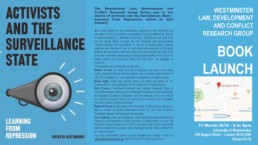
Professor Nazira Camely to gave us a seminar on “The agrarian problem in areas of conservation units in the Brazilian Amazon: a study on the Extractive Reserve Chico Mendes”. Professor Camely provided new and refreshing perspectives on the debates over environmental conflicts in Brazil.
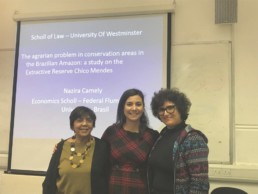
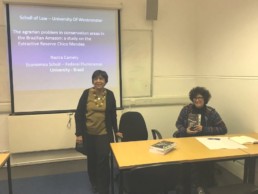
The Event was a lively discussion by an exciting and diverse panel of speakers from social movements, the legal profession and rights scholars to celebrate the launch of their new publication What’s Wrong With Rights? Social Movements, Law and Liberal Imaginations.

